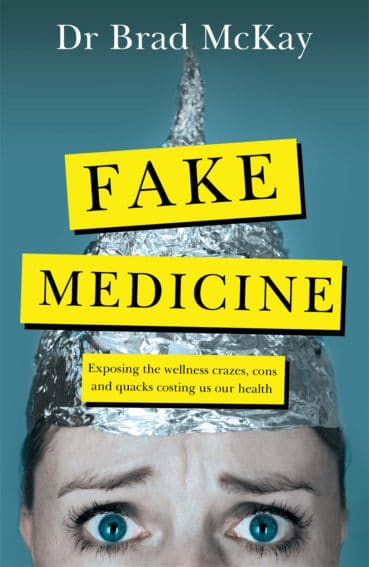If I search on Amazon for books on Alternative Medicine, I get between 50,000 and 60,000 volumes, depending on what country I am in. As a very rough guess, I estimate that about 95% of them are rubbish – not just useless, but dangerous. Because of this lamentable situation, I am excited each time I come across one that belongs to the other 5%. And in recent years, there have been quite a few.
No, don’t worry, I am not about to advertise another book of mine; I want to recommend to you Fake Medicine, by Dr Brad McKay
The new book is advertised with the following blurb:
“Dr Brad McKay, Australian GP and science communicator, has seen the rise of misinformation permeate our lives and watched as many of us have turned away from health experts. Too often, we place our trust in online influencers, celebrities and Dr Google when it comes to making important health decisions. Fake Medicine explores the potential dangers of wellness warriors, anti-vaxxers, fad diets, dodgy supplements, alternative practitioners and conspiracy theories. This book is an essential tool for debunking pseudoscience and protecting you and your loved ones from the health scams that surround us. Protect your mind, body and wallet by fighting fake medicine.”

It describes the book fairly accurately. McKay covers all of these subjects with considerable skill. His book is well-suited for people who are newcomers to the critical assessment of so-called alternative medicine (SCAM); the text is free of jargon or long-winded technical explanations. Instead, the author mostly tells stories of events that actually happened to him, often in a most personal fashion. Take, for instance, his experience as a young gay Australian with a form of ‘conversion therapy’ administered by religious zealots, or the story where he took some dodgy Chinese medicine to boost his energy levels.
Lots of people have done similarly unwise things, of course, but not many of those people are doctors who can thus put their experience into a medical perspective. And crucially, not many can write as entertainingly as McKay. I had thought I knew most of what there is to know about SCAM, but I did learn something new from McKay’s new book: did you know what Gish Gallop is? Well, I didn’t!
One of the most useful parts of the book is chapter 16 where McKay tells everyone what they can and should do to stop fake medicine in its tracks. And he really does mean EVERYONE! – not just skeptics or sceptics or activists or scientists. This book is truly written for laypeople. You don’t belong to this group? Buy Fake Medicine anyway and give it to someone from your circle of friends who needs it. I am sure there are a few.



